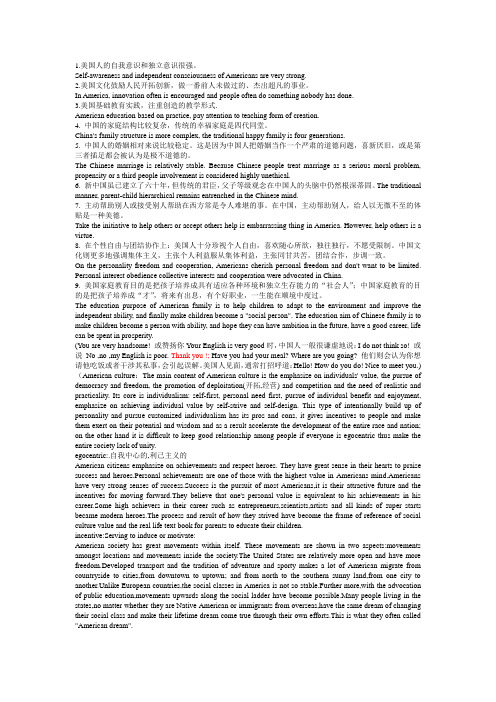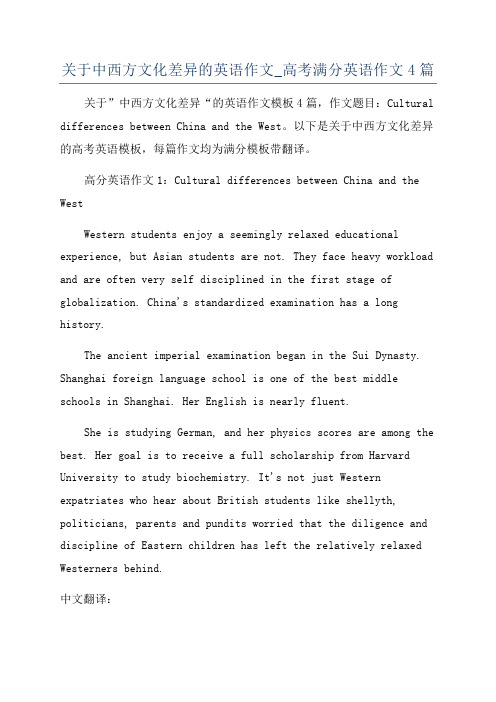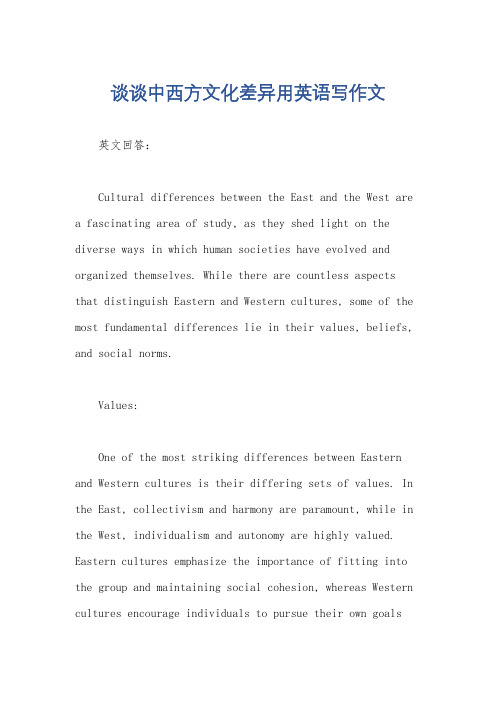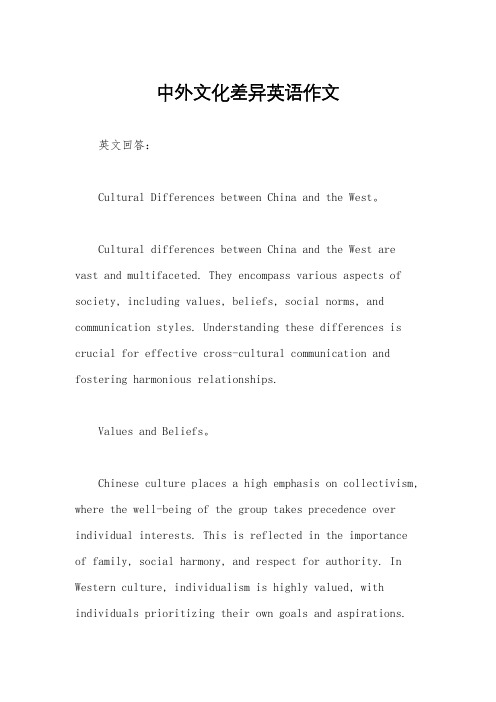英文各国文化差异
- 格式:doc
- 大小:66.50 KB
- 文档页数:8


1.美国人的自我意识和独立意识很强。
Self-awareness and independent consciousness of Americans are very strong.2.美国文化鼓励人民开拓创新,做一番前人未做过的、杰出超凡的事业。
In America, innovation often is encouraged and people often do something nobody has done.3.美国基础教育实践,注重创造的教学形式.American education based on practice, pay attention to teaching form of creation.4. 中国的家庭结构比较复杂,传统的幸福家庭是四代同堂。
China's family structure is more complex, the traditional happy family is four generations.5. 中国人的婚姻相对来说比较稳定。
这是因为中国人把婚姻当作一个严肃的道德问题,喜新厌旧,或是第三者插足都会被认为是极不道德的。
The Chinese marriage is relatively stable. Because Chinese people treat marriage as a serious moral problem, propensity or a third people involvement is considered highly unethical.6. 新中国虽已建立了六十年,但传统的君臣,父子等级观念在中国人的头脑中仍然根深蒂固。
The traditional manner, parent-child hierarchical remains entrenched in the Chinese mind.7. 主动帮助别人或接受别人帮助在西方常是令人难堪的事。

1.美国人的自我意识和独立意识很强。
Self-awareness and independent consciousness of Americans are very strong.2.美国文化鼓励人民开拓创新,做一番前人未做过的、杰出超凡的事业。
In America, innovation often is encouraged and people often do something nobody has done. 3.美国基础教育实践,注重创造的教学形式.American education based on practice, pay attention to teaching form of creation.4. 中国的家庭结构比较复杂,传统的幸福家庭是四代同堂。
China's family structure is more complex, the traditional happy family is four generations.5. 中国人的婚姻相对来说比较稳定。
这是因为中国人把婚姻当作一个严肃的道德问题,喜新厌旧,或是第三者插足都会被认为是极不道德的。
The Chinese marriage is relatively stable. Because Chinese people treat marriage as a serious moral problem, propensity or a third people involvement is considered highly unethical.6. 新中国虽已建立了六十年,但传统的君臣,父子等级观念在中国人的头脑中仍然根深蒂固。
The traditional manner, parent-child hierarchical remains entrenched in the Chinese mind.7. 主动帮助别人或接受别人帮助在西方常是令人难堪的事。



关于中西方文化差异的英语作文_高考满分英语作文4篇关于”中西方文化差异“的英语作文模板4篇,作文题目:Cultural differences between China and the West。
以下是关于中西方文化差异的高考英语模板,每篇作文均为满分模板带翻译。
高分英语作文1:Cultural differences between China and the WestWestern students enjoy a seemingly relaxed educational experience, but Asian students are not. They face heavy workload and are often very self disciplined in the first stage of globalization. China's standardized examination has a long history.The ancient imperial examination began in the Sui Dynasty. Shanghai foreign language school is one of the best middle schools in Shanghai. Her English is nearly fluent.She is studying German, and her physics scores are among the best. Her goal is to receive a full scholarship from Harvard University to study biochemistry. It's not just Western expatriates who hear about British students like shellyth, politicians, parents and pundits worried that the diligence and discipline of Eastern children has left the relatively relaxed Westerners behind.中文翻译:西方学生享受着看似轻松的教育体验,但亚洲的学生却并非如此,他们面临着繁重的工作量,而且在全球化的第一阶段往往非常自律。

谈谈中西方文化差异用英语写作文英文回答:Cultural differences between the East and the West are a fascinating area of study, as they shed light on the diverse ways in which human societies have evolved and organized themselves. While there are countless aspects that distinguish Eastern and Western cultures, some of the most fundamental differences lie in their values, beliefs, and social norms.Values:One of the most striking differences between Eastern and Western cultures is their differing sets of values. In the East, collectivism and harmony are paramount, while in the West, individualism and autonomy are highly valued. Eastern cultures emphasize the importance of fitting into the group and maintaining social cohesion, whereas Western cultures encourage individuals to pursue their own goalsand desires.Beliefs:Another fundamental difference lies in the religious beliefs and spiritual practices that prevail in each region. Eastern cultures are heavily influenced by Easternreligions such as Buddhism, Confucianism, and Taoism, which emphasize concepts of karma, reincarnation, and the interconnectedness of all things. Western cultures, on the other hand, are rooted in the Judeo-Christian tradition, which places a strong emphasis on monotheism, personal salvation, and the separation between humans and God.Social Norms:The social norms and customs that shape daily life in Eastern and Western cultures also differ significantly. In the East, there is a strong emphasis on respect for authority, hierarchy, and tradition. Individuals are expected to conform to social expectations and avoidcausing shame to their family or community. In the West,social norms are more egalitarian, and individuals are encouraged to question authority and express their own viewpoints.Communication:Communication styles also vary between Eastern and Western cultures. In the East, communication tends to be indirect and implicit, with a focus on non-verbal cues and subtle hints. In the West, communication is often more direct and explicit, with a strong emphasis on clarity and efficiency.Time Perception:Another notable difference is in the way that Eastern and Western cultures perceive time. Eastern cultures tend to view time as cyclical and fluid, while Western cultures view it as linear and finite. This difference can manifest in various aspects of life, such as attitudes toward work, leisure, and personal relationships.These are just a few examples of the countless cultural differences that exist between the East and the West. These differences shape everything from the way that people interact with each other to the way that they view theworld around them. Recognizing and understanding these differences is crucial for fostering mutual respect and cooperation between cultures.中文回答:文化差异。



中国文化和美国文化的差异英文Differences between Chinese and American CulturesCulture is shaped by many factors such as history, customs, traditions, and values. China and the United States are two major countries with rich cultural heritages. Although globalization has brought people from different countries closer together, there are still significant differences between Chinese and American cultures. In this essay, I will discuss some of the most prominent contrasts between the two cultures.Family values and structure also differ greatly between the two cultures. In Chinese culture, family is considered the cornerstone of society, with strong filial piety and respect for elders. The Chinese tend to have a collective responsibility for their family members and prioritize their needs and well-being. In contrast, American culture places more emphasis on independence and individuality. Family units in the United States tend to be more nuclear, with greater autonomy and less involvement from extended family members.Religion and spirituality also differ between the two cultures. China has a long-standing history of Confucianism, Taoism, and Buddhism, with a focus on moral principles, social harmony, and personal enlightenment. Religion plays asignificant role in shaping Chinese culture and society. In contrast, the United States has a more diverse religiouslandscape, with Christianity being the predominant faith. The United States is known for its religious freedom, where individuals have the freedom to practice their own religion or have no religion at all.。

中外文化差异英语作文英文回答:Cultural Differences between China and the West。
Cultural differences between China and the West are vast and multifaceted. They encompass various aspects of society, including values, beliefs, social norms, and communication styles. Understanding these differences is crucial for effective cross-cultural communication and fostering harmonious relationships.Values and Beliefs。
Chinese culture places a high emphasis on collectivism, where the well-being of the group takes precedence over individual interests. This is reflected in the importance of family, social harmony, and respect for authority. In Western culture, individualism is highly valued, with individuals prioritizing their own goals and aspirations.Social Norms。
Social norms in China often emphasize modesty, politeness, and restraint. Individuals are expected to be humble, avoid drawing attention to themselves, and maintain a harmonious social environment. In Western cultures, self-expression, assertiveness, and directness are more common.Communication Styles。


Cultural practices, cultural differences, local manners, and mores: traveling the globe can be a behavioral minefield, even when you have the best intentions. Everything from greeting to eating can be an opportunity to do the wrong thing, and not only embarrass yourself, but offend your host countrymen. Look out for the following cultural mistakes and try to avoid them while going abroad。
文化习惯、文化差异、当地礼仪和风俗:即使你怀着良好的意愿,这些文化陷阱也可能让你的环球旅游险象环生。
从问候到饮食,稍不留神就会出差错,不仅让自己难堪,还有可能冒犯东道主。
到国外时要特别留心并尽量避免误入以下几种文化陷阱。
Touching Someone 触摸他人Where It's Offensive: Korea, Thailand, China, Europe, the Middle East。
禁忌地:韩国、泰国、欧洲、中东What's Offensive 禁忌:Personal space varies as you travel the globe. In Mediterranean countries, if you refrain from touching someone's arm when talking to them or if you don't greet them with kisses or a warm embrace, you'll be considered cold. But backslap someone who isn't a family member or a good friend in Korea, and you'll make them uncomfortable. In Thailand, the head is considered sacred--never even pat a child on the head。
个人空间的概念因地而异。
在地中海国家,如果你和别人交谈时没有碰对方的手臂,或见面问候时没和对方亲吻拥抱,别人会认为你不热情。
但在韩国,拍别人的背会让对方感觉不安,除非此人是你的家庭成员或好友。
在泰国,头是很神圣的部位??就算是小孩子的头也不要随便乱拍。
What You Should Do Instead 对策:Observe what locals are doing and follow suit. In Eastern countries remember that touching and public displays of affection are unacceptable. In places like Qatar and Saudi Arabia, men and women are forbidden from interacting, let along touching。
观察当地人的一举一动并照着做。
记住,在东方国家,身体接触或在公众场合流露感情往往不被人接受。
在卡塔尔和沙特阿拉伯这样的地方,男女交往都被禁止,更不要说身体接触了。
Blowing Your Nose 擤鼻涕Where It's Offensive: Japan, China, Saudi Arabia, France。
禁忌地:日本、沙特阿拉伯、法国What's Offensive 禁忌:Some cultures find it disgusting to blow your nose in public--especially at the table. The Japanese and Chinese are also repelled by the idea of a handkerchief。
有些文化认为当众擤鼻涕是让人厌恶的行为??尤其在餐桌上。
日本人还排斥使用手帕。
What You Should Do Instead 对策:If traveling through Eastern and Asian countries, leave the hankies at home and opt for disposable tissues instead. In France as well as in Eastern countries, if you're dining and need to clear your nasal passages, excuse yourself and head to the restroom. Worst-case scenario: make an exaggerated effort to steer away from the table. Let's hope you don't have a cold。
到东方或亚洲国家旅游时,把手帕留在家中,选择用一次性纸巾吧!在法国以及一些东方国家,如果在就餐过程中你需要擤鼻涕,要先说声“请原谅”再去洗手间。
最糟糕的情景是:极为夸张地从餐桌上扭过头去擤鼻涕。
还是祈祷自己不要感冒吧!Talking Over Dinner 就餐时谈话就餐Where It's Offensive: Africa, Japan, Thailand, China, Finland.禁忌地禁忌地禁忌地禁忌地非洲、日本、泰国、芬兰What's Offensive 禁忌:In some countries, like China, Japan, and some African nations, the food's the thing, so don't start chatting about your day's adventures while everyone else is digging into dinner. You'll likely be met with silence--not because your group is unfriendly, but because mealtimes are for eating, not talking. Also avoid conversations in places a country might consider sacred or reflective--churches in Europe, temples in Thailand, and saunas in Finland. What You Should Do Instead在一些国家,如中国,日本和一些非洲国家,食品的东西,所以不要一开始聊起一天的冒险,而其他人都在大快朵颐。
你很可能会遭遇沉默- 这并非你是不友好的,但因为就餐时间都是用来吃的,不说话。
此外,还要避免谈话的地方,一些被认为是神圣或需要沉思- 比如欧洲的教堂,泰国的庙宇和芬兰的桑拿浴室。
你应该做的What You Should Do Instead 对策Keep quiet! 保持沉默!Removing Your Shoes…or Not 脱鞋......与否Where It's Offensive: Hawaii, the South Pacific, Korea, China, Thailand.禁忌:夏威夷、太平洋群岛、韩国、泰国What's Offensive 禁忌:Take off your shoes when arriving at the door of a London dinner party and the hostess will find you uncivilized, but fail to remove your shoes before entering a home in Asia, Hawaii, or the Pacific Islands and you'll be considered disrespectful. Not only does shoe removal verypractically keeps sand and dirt out of the house, it's a sign of leaving the outside world behind. Corporate culture and negotiation style脱掉你的鞋子到达的伦敦晚宴的门时,女主人会认为你不文明,但在进入亚洲,夏威夷或太平洋群岛的居民家中不脱鞋,你会被认为失礼。
不仅脱掉鞋子几乎把沙粒和灰尘的房子,这是一个迹象,把外面的世界抛在脑后。
What You Should Do Instead 对策If you see a row of shoes at the door, start undoing your laces. If not, keep the shoes on.如果你在门口看到一排鞋子,就解开自己的鞋带开。
否则,就穿鞋进去吧!Knowing Your Right from Your Left 分清左右手Where It's Offensive: India, Morocco, Africa, the Middle East.禁忌地:印度、非洲、中东What's Offensive 禁忌:Many cultures still prefer to eat using traditional methods--their hands. In these cases, food is often offered communally, which is why it's important to wash your hands before eating and observe the right-hand-is-for-eating and the left-hand-is-for-other-duties rule. If you eat with your left hand, expect your fellow diners to be mortified. And when partaking from a communal bowl, stick to a portion that's closest to you. Do not get greedy and plunge your hand into the center.许多文化依然喜欢吃用传统的方法- 他们的手。